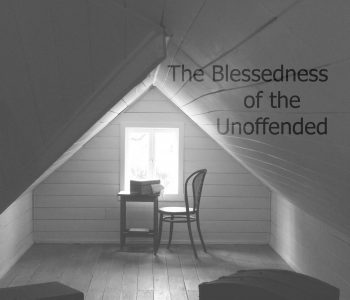 Other Authors
Other Authors
The Miracle Christ Would Not Perform
We can be so impressed by the acute sufferings which came upon our Lord at the time of His crucifixion that we miss one of the trials which may appear minor to us, but which was surely a great temptation. I speak of the satanic challenge to Christ to come down from the cross. ‘If you are really the Son of God’, the senseless mob howled, ‘then show what you can do by stepping down off that cross.’ The rulers took up this jeering attack, adding their bitter challenge to the One whom they refused to acknowledge as God’s Son.
Now, had this been the impossibility which they unbelievingly imagined it to be, their words would only have been an aggravation of His helplessness. But was it impossible? Was He indeed helpless? If not, then this was more than a brutal teasing; it was a cunning and diabolical suggestion that He should use His divine power for self-preservation. Put yourself in His position. If you were a helpless victim, fast nailed to that cruel cross, you would suffer additional pain from men’s gibes, but it would only be one more hurt among so many. But supposing you could free yourself! Suppose that you could just step down from that cross and laugh at its inability to hold you. Would not the call to come down be irresistible? What would you do? I can almost hear myself muttering: ‘I’ll show them’ and doing just that. But then I am a fallen man and not the eternal Son of God.
These suppositions may sound rather foolish, and I only make them to help us to appreciate the marvellous spiritual strength of our wonderful Saviour. The words of Nehemiah refer to a much smaller trial, but they apply in a sublime way to the attitude of the Lord Jesus. “I am doing a great work, so that I cannot come down.” ( Neh. 6:3). The impossibility was not physical but moral and spiritual. He refused to come down not because He was unable to do so, but because He chose to stay there and finish the work of redemption. He turned a deaf ear to their devilish invitation, allowing Himself to be ‘lifted up’, even as He had said He would.
The carnal mockers were so deluded that they persuaded themselves that Jesus could not be the Son of God because He did not come down from the cross. But later the centurion, with a flash of Spirit-given illumination, realised that the very fact that He stayed there to the bitter end proved that He really was the Son of God: “And when the centurion, which stood by over against Him, saw that He so gave up the ghost, he said, Truly this man was the Son of God” (Mark 15:39). We are familiar with the words: “God so loved…” in John 3:16. Here we have the same adverb – “He so gave up the ghost…”. It was as if the Roman realised that this was a greater miracle than climbing down off the cross; this was the vanquishing of death by dying.
The Son of God used His will to stay on the cross. As He Himself had earlier stated: “Therefore doth the Father love Me, because I lay down My life… No one taketh it away from Me, but I lay it down of Myself. I have power to lay it down, and I have power to take it again” (John 10:17-18). Because He was the Son of God it would have been so easy to call a halt to the reckless mockery by walking unharmed away from His would-be murderers as He had frequently done when His time had not yet come. But now the time had come. He was finishing His great work so that He could not go down.
How often during those brief years of public ministry the Lord had made it plain that He had no lack of divine authority and energy. When the waters of Galilee’s sea were being whipped up into a frenzy by hurricane winds, He calmly walked upon that surface as though it were smooth and solid. On another occasion He only had to stand up in their storm-tossed boat and command an end to the storm, “and there was a calm”. But more than this, He left on record as His final public miracle the fact that a flourishing fig tree could immediately be reduced to a withered wreck by His word (Matthew 21:19).
This was a strange miracle. Sentimental tree-lovers have been scandalised by it. Even those who fully accept His other wonders find some mystery about this withering of the fig tree. Unlike the rest of His miracles, it brought no relief to anybody. It was no miracle of mercy. To the unenlightened it might seem to have been a wanton exhibition of power or even an aggrieved act of vindictiveness. It was neither. The Lord Jesus would never have used His divine power for such mean purposes. Then why did He do it?
Many godly interpreters have explained that this was a symbolic act, representative of the rejection of the fruitless nation Israel. Such an explanation has several points to commend it, but it has others which equally exclude it. And so far as I am concerned this interpretation is unacceptable because in performing the act Jesus said: “Let there be no fruit from thee henceforward forever“. My reading of Scripture tells me that Israel still has a future. She has been set aside? Yes. She has been visited in judgment? Yes, and in judgments fearful in their intensity which may yet not be over. But cast off for ever? No! “God forbid” said Paul, “God did not cast off His people which He foreknew”. So I do not see how this action of cursing the fig tree can rightly be applied to that unhappy but chosen nation of Israel.
You will say that the miracle was explained by the Lord Jesus as being given to stimulate the faith of His disciples so that they – and we – might realise that by prayer we can have spiritual authority to wither up evil powers. I accept this. In fact I have often thought that the Church should put such aggressive prayer into action much more than it usually does. Nevertheless, the Lord never promised us that we should be able literally to wither up trees in this way and nobody else has ever done it. But He did it! And so far as His public ministry was concerned He made this the climax of the miraculous proofs of His deity. So again I ask, Why did He do it?
May I humbly suggest a thought which has come to me in this connection? It is that He did this wonder, and did it at this time, so that the world should know that had He wished to do so He could have spoken words which would have shrivelled up that wooden cross. Had He pronounced that curse at Calvary there would have been an immediate disintegration into innumerable fragments of that hateful monstrosity of a ‘tree’ on which they nailed Him. What is more, if such powers of judgment belonged to Him as the Son of God (and I, for one, believe that they did), then a word from Him would have crushed those cruel participators in His crucifixion into insignificance. Jew and Gentile alike, they would have been as withered from the roots of their beings just as that fig tree was, if He had uttered His curse upon them. It may be true that Christ’s action with the fig tree portrayed lessons which are essentially spiritual, but His miracle of judgment was fearfully literal.
“Come down from the cross…” the scoffers cried. They little dreamed how near they were, in a sense, to seeing Him do just that. And yet, we cannot say that the Lord even considered doing so, for this issue had been settled already in the garden of Gethsemane. There Jesus had agonised over this very matter and had deliberately chosen to go right through to the end with His sacrifice for our salvation. But let us make no mistake about it; He stayed on the cross because He chose to do so and not because any cords or nails held Him there.
“Let Him now come down from the cross, and we will believe on Him” the scoffing priests and scribes cried. Satan had tried this ploy at the beginning when he suggested to Christ in the wilderness that He should give public proof of His eternal sonship by jumping from the pinnacle of the temple and landing unharmed amidst a crowd of astonished worshippers. Had He done this, it would certainly have created a tremendous sensation. It might have produced many followers – of a sort. But our Lord rightly rejected sensational publicity: true believers are not made by this kind of thing. He kept close to the Word of God and would neither worship Satan (the god of this world) nor tempt God by sensationalism. Well, the Devil was defeated then, but he came back again and again and made his last great effort to seduce Christ even while He hung on that cross. If Jesus had stepped down, recovered His garments from the gambling soldiers, resumed them, and then walked away with His happy friend, John and His human mother, Mary, what a sensation it would have created. “Now come down from the cross, that we may see and believe,” they promised. With such a sensation on hand they might even have become His enthusiastic followers, but what a travesty that would have been of true faith. How different from the worshipping wonder of the centurion who glorified God that His Son refused to come down from the cross!
Let me repeat it, Jesus could have stepped down. But let us all thank God that He refused to do so. Think of the dying thief, left to hang there with his blaspheming companion, and no Saviour to comfort him in time and to receive his soul in eternity. What a horror for that poor sinner if his only hope had vacated His own cross and left His repentant companion to perish on his. And what a horror for me too, who would be left in the same plight if Christ had never cried: “It is finished”. Men are not saved by sensations but by His sacrifice. If Jesus had only lived and taught, and even suffered, there would be no hope for my guilty soul. It is because He died that I live. It is because He refused to vacate the cross of judgment that I shall never enter into condemnation. I rejoice with the thief, and multitudes more, that Christ did not come down from the cross.
Great as the issue of salvation is, there is something even greater, and that is the satisfaction of God. It was the Father who would have been most affected if the Lord had come down. Twice with the shadow of His cross already upon Him, the Lord Jesus was greeted by the Father in terms of deep approbation. When Jesus chose to be identified with sinners in John’s baptism, the voice from heaven declared: “This is my beloved Son, with whom I am well pleased” (Matthew 3:17). Then again, when on the Mount of Transfiguration, the Lord spoke with Moses and Elijah about His coming passion, the Father burst forth from heaven with His jubilant acclaim: “This is My beloved Son, with whom I am well pleased…” (Matthew 17:5). Now they had passed from the shadow to the reality. What could the Father have said this time, if His Son had gone back on His earlier intentions and stepped down from that cross? He would never disown the Son. He would never change in His Father’s love. So He could still have announced that this was His beloved Son, but how could He have finished the sentence ‘…but I am rather disappointed with Him’? The very words sound blasphemous.
They might apply aptly enough to us. Thank God that through Christ we are His sons, and He will never disown us. Thank God that we, too, are greatly loved, and nothing can alter that Father’s love to us who trust in Christ. But in our case God might have to say, rather wistfully, ‘Yes they are My beloved sons but I am rather disappointed with them at the moment’. We are beloved sons but we cannot claim always to do His good pleasure. Christ, however, is quite different. He always brought pleasure to the Father’s heart, and never more than when He resolutely refused to free Himself from those hateful crucifying nails. So even if no dying thief were welcomed into paradise, and even if no sinner ever called upon the Lord for salvation, Christ would still have remained on the cross, for in doing so He was bringing deep satisfaction to the Father in heaven.
It is true that this time there was no voice from heaven. No, but there was something better. The glory of the Father penetrated that sealed tomb and raised the beloved Son from the dead. How much better to be raised up than to step down! The centurion was proved right; Jesus Christ was declared to be the Son of God with power by His resurrection from the dead (Romans 1:4). The Lord Jesus had proved in fullest measure what many godly believers had previously tasted in part, that when a person refuses to fight for himself, God will fight for him; and that when a believer is prepared even to go to the death for God, he can always count on the One who raises the dead to vindicate his faith. To carnal hearts it would have seemed a marvellous miracle for the distressed Jesus to have descended from the cross, but to believing hearts the true miracle is that God raised Him from the dead.
We gratefully worship the Saviour for refusing to choose the easier way. He turned a deaf ear to the tempter’s subtle call; He would not come down from the cross. As we worship, though, we must ask ourselves if there is any lesson for us, who have been called upon to take up our cross daily and follow Him. In this matter perhaps Nehemiah’s words apply more correctly to us than they do to our Lord. For, like Nehemiah, we have many adversaries in the life and work to which the Lord has called us. Sometimes our enemy tries to frighten us by frontal attacks. These may be fierce and hard to bear, but at least we know them for what they are and are able to trust the Lord to help us to ignore them. The most perilous, as Nehemiah himself found, are those subtle schemings which seem plausible enough and which appeal to our natural instincts of self-preservation. ‘Come down,’ the tempter calls. ‘Why should you endure such injustice? Why should you be imposed upon? Surely you have suffered enough already. You can be rid of it all if you want to. Call it a day! Step down from your cross.’
There is nothing mystical about this. It is a fact of life for the Christian that he is constantly being faced by a strong temptation to choose the easier way. It comes to us all. Like the mockers at Calvary, voices all around us call us to abandon our cross and come down. In our case the advice may not come from intentional scoffers, but from considerate friends. What do you suppose that John and Mary thought when they heard the suggestion? I cannot but feel that in their hearts they wished that even at that late hour Jesus would come down and be spared the pangs and shame of crucifixion. Whatever they thought, though, they kept silent, whereas some time before Peter had been unable to do that and had urged Christ never to let Himself be crucified. Behind the well-intentioned protestations of Peter, Christ discerned the snare of Satan, and He said so in emphatic terms. It is always Satan who tries to dissuade us from following the Crucified. Whether he uses the sneers of our enemies or the kindly advice of our dearest friends, his persistent effort is to induce us to save ourselves and to come down from the will of God.
Nehemiah had the invitation to come down four times over, but each time he gave the same answer. It was that God’s work was much more important than his own comfort or safety. “Why should the work of God cease, whilst I leave it and come down…?” he asked (Nehemiah 6:3). Why indeed? Alas, with many of us it often does. It seems that from the first Nehemiah realised that there was a subtle trap in this invitation to confer in a village of the plain of Ono. Ono means ‘strength’ and it often seems strong and clever to get involved in a world of conferences and arguments instead of getting quietly and steadily along with the work committed to us. It is a false strength which draws us into impulsive self effort. Christ refused to exercise it. He preferred to stay on the cross in the will of the Father and demonstrate the true power of God which is by resurrection.
So for us it is not only a question of whether or not we can be persuaded to abandon the work and come down to seek our own interests, but a greater challenge as to whether we will come down or wait for God to raise us up. The two are inextricably bound up together, refusing to come down out of the will of God and proving the power of resurrection. Had Nehemiah relaxed from the work and responded to the invitation to come down, he would never have lived to make that glorious declaration: “The joy of the Lord is your strength” (Nehemiah 8:10). It would have been disaster. But because he refused to come down, he was able to report: “So the wall was finished…” (Nehemiah 6:15). And because our Saviour refused to come down from the cross He was able to cry in triumph: “It is finished”. So the challenge is passed on to us. Will we go right through with the will of God? Shall we be able to claim, like Paul, “I have finished my course”? Every day is for us a day of choice as to whether we will bear our cross and count on the God of resurrection or take our affairs into our own hands and step down from the particular feature of the cross which we are being asked to bear. Let us forget ourselves. Let us close our ears to every other voice but God’s. Let us say, like Nehemiah: “I am doing a great work, so that I cannot come down”.
By Harry Foster, first published in Toward the Mark magazine, September 1975.



















